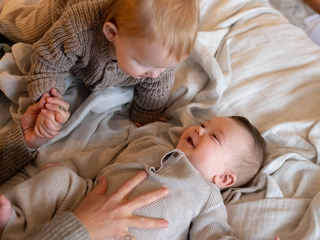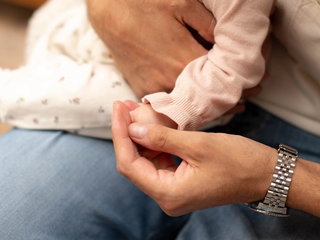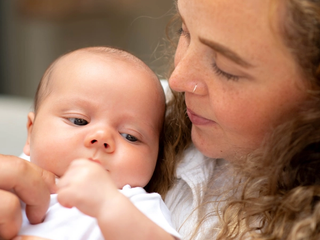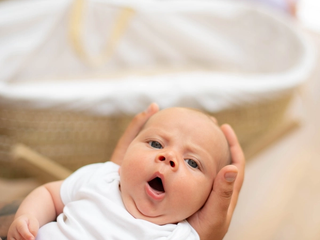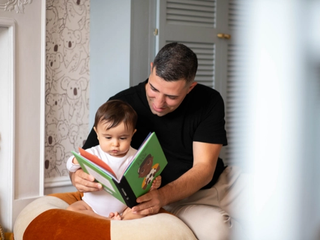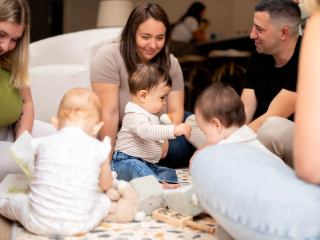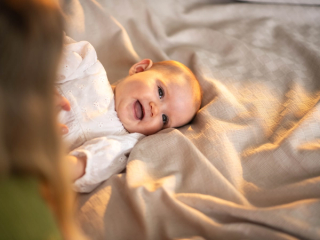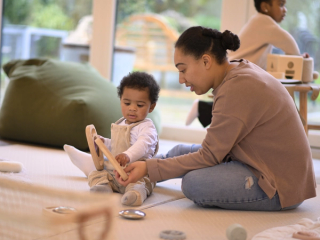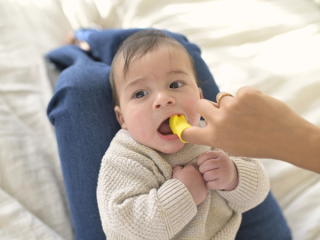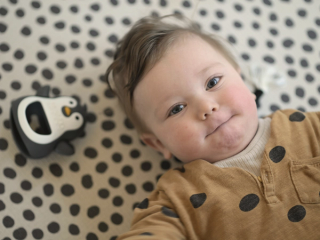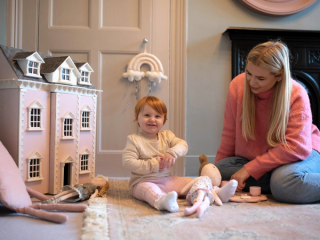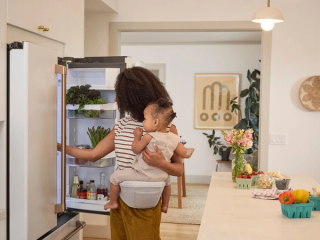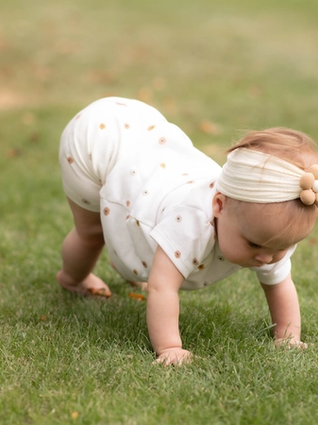
- Home
- Advice Hub
- Baby
- Bonding & Development
- Understanding Baby Leaps
Understanding baby development leaps
Discover what baby leaps are, signs your baby might be in one, and how to gently support their development during these natural growth phases.
We’ve probably all had it said to us, as we’re holding our baby and they’re a little unsettled that day - ‘Aww maybe they’re going through a leap’. But what exactly is a developmental leap? Are they suddenly going to jump up and leap across the room? Channelling their inner ‘future Olympic athlete’! Obviously not, but here’s what baby leaps are, why you need to know about them and how it may explain why your baby’s behaviour is changing as they grow and learn new things.
As with all things child development, every single baby is on their own journey. Child development is not a nice, neat, orderly linear line. Child development is quite the opposite. I like to compare it to a spider’s web or a bowl of spaghetti. They develop in different areas at different points as they make new connections in their brain, have different experiences and make sense of the world around them. As a result of this some babies may show clear signs of a baby developmental leap whereas others may move through them without you even realising.
What are baby leaps?
Baby leaps are moments of intense developmental progression where babies can appear more unsettled or acutely aware of their surroundings. As a mum, it’s the moments where I was like ‘Oh my goodness, what is going on, my baby isn’t usually like this!’ Often googling into my phone at 2am in the morning!
What causes a leap?
Newborn leaps and baby leaps are usually caused by their brain processing new experiences, making crucial connections, or their body mastering new movements. Think of it as your baby's brain making a huge internal upgrade and sometimes, those upgrades come with a few temporary glitches! The good news is that these periods are always temporary and are a fundamental part of a baby's natural growth process.
Are leaps the same as growth spurts?
Although they sound similar, developmental leaps are different to growth spurts. Growth spurts typically refer to physical growth, such as a sudden increase in height or weight. My little boy is 5 now and is constantly told ‘Wow you’ve had a growth spurt!’, where people can’t believe how tall he has got since they last saw him.
Leaps, however, relate to cognitive and emotional development - think ‘all in the brain and mind’ those internal shifts in understanding and perception.
While it's entirely possible for both a growth spurt and a developmental leap to occur simultaneously, they are not always directly linked. Your baby might be physically growing rapidly while also undergoing significant emotional or cognitive changes, or they might experience one without the other.
Signs your baby may be in a leap
When I was rocking my baby to sleep at 2am, wondering what on earth was going on, I can assure you I became a pro in recognising the signs of a baby leap. You don’t need to be a doctor to recognise the signs but simply tuning into your child - you will notice everyday shifts in your baby’s behaviour.
I’ve put together a few signs of developmental leaps that are common, though certainly not universal, and vary from one baby to the next - remember what I always say, one size does not fit all!
Changes in behaviour or mood
One of the most common indicators is a shift in your baby's usual demeanour. You might notice your little one becoming more clingy, tearful, or generally fussier than usual. They may seem to want more reassurance, needing constant cuddles or comfort from their primary caregivers. Sometimes, babies might also appear overstimulated by new surroundings or situations that they previously handled well. This increased need for reassurance is typical during these intense periods of development.
Changes in feeding habits
Feeding patterns can also be affected. Some babies might suddenly seem to want to feed more frequently, often seeking comfort at the breast or bottle (I can tell you this was the case for me at 2am!). On the other hand, others might show less interest in feeding, becoming easily distracted by their newly heightened awareness of the world around them. It’s important to remember that these changes are usually temporary and will typically resolve as the leap passes.
Changes in sleep patterns
The one none of us want to hear! Unfortunately, sleep is frequently impacted during a developmental leap. Parents often notice common shifts like babies waking more often during the night, resisting naps, or experiencing changes in the duration of their sleep periods. These disruptions don't mean you're doing anything wrong; they are literally a direct result of the intense developmental growth occurring.
Increased need for comfort and closeness
This one you might like to hear! When going through a leap you might find your baby wants to be held more often, perhaps seeming uncomfortable when put down, or preferring to be in close physical contact with you. If you’re here for the snuggles on the sofa then embrace it and snuggle down, it’s not so ideal when you have lots to be getting on with though! This increased need for contact and physical reassurance is a very typical response to the overwhelming internal changes they are experiencing.
Trying new skills or movements
When your baby is going through a leap it often excitingly means that they are learning a whole host of new skills and movements. These can range from grasping objects, rolling over, babbling, or even demonstrating new levels of recognition. Interestingly, sometimes the changes in sleep and mood that characterise a leap might appear before these new skills fully emerge, almost as if their brain is preparing for the new ability. This can make the fussiness seem all the more bewildering until you finally witness the breakthrough, and then I can promise you it makes the 2am wake ups worth it!
Sleep changes during a leap
The impact of developmental leaps on sleep is a common concern for us all as parents, and it’s a topic worth addressing in more detail. Leaps can significantly disrupt a baby's sleep pattern, leading to more frequent night wakings or making it much harder for your baby to settle down for naps or bedtime. Although at the time this can be a really tough and challenging phase, It's crucial to remember that this is a temporary phase and is not at all a reflection of your parenting - trust me, it happens to all of us!
Why does sleep change during a leap?
Essentially, your baby is developing and changing! The intense developmental growth occurring in your baby's brain can make them more alert and emotionally sensitive. Their minds are buzzing with new connections and discoveries, making it difficult for them to switch off and enter deep sleep (a bit like us when we have things on our mind!). They might be processing new sensory information, rolling around using their new found motor skills or feeling more aware of their surroundings, all of which can contribute to sleep disruptions.
Should I change my routine?
When faced with these sleep challenges, many parents wonder if they should change their established routine. The advice here is to keep your routines flexible but consistent. While you might need to adjust timings slightly or offer more comfort, it's generally best to avoid introducing entirely new habits unless absolutely necessary. Reassure yourself that these sleep disruptions are temporary, and things often settle back into their usual rhythm once the leap has passed and your baby has integrated their new skills.
How long do baby leaps last?
How long is a piece of string? I really can’t give you an answer to this because there’s no hard and fast rule for the duration of a baby leap, as every baby follows their own timeline. Generally, a leap might last anywhere from a few days to a few weeks. Some leaps might be quite intense and noticeable, while others might pass without you even realising. The most important thing is to avoid strict schedules or comparing your baby’s development to others, and instead, be guided by your baby’s unique cues.
Toddler developmental leaps
I’m not sure if this is good news or bad news to share, but it's not just babies who experience these intense periods of growth! Similar developmental leaps can also occur during toddlerhood. These later leaps often relate to significant advancements in speech development, mastering new movements, and a growing sense of independence. As with infancy, offering continued emotional support and understanding during these times is incredibly valuable, helping your toddler navigate their expanding world.
FAQs around baby leaps
You might notice several signs, including increased fussiness, changes in their sleep patterns, or the emergence of new skills. Remember, every baby is different, and not all leaps will look the same or present with identical symptoms. Trust your instincts and observe your baby's individual behaviour.
It's difficult and unhelpful to rank leaps, as what one parent finds challenging, another might navigate more easily. I always say this about periods of parenting too, all aspects can be challenging it’s just a new challenge! However, some parents do find certain leaps more intense. This is often because babies might become more acutely aware of things like separation from their primary caregiver or other significant changes in their environment. Avoid comparing or worrying about which leap might be 'hardest'; instead, focus on providing consistent comfort and reassurance.
Developmental leaps can happen at various stages throughout a baby's first few years of life. However, it's vital to remember that not every baby will follow a set pattern or timeline. While some guides might suggest specific weeks or months, these are general frameworks, not strict rules.
You might come across guides or frameworks that outline 10 specific leaps occurring during a baby's first 20 months. While this is a common and helpful way to understand potential developmental changes, it's crucial to clarify that this is a framework and not a strict rule that all babies will follow. The one thing that I want you to remember is that babies grow and develop at their own individual pace.
The biggest take away from understanding what baby leaps are? You won’t really know when they’re coming, and when they do you may experience unpredictable behaviour. Tune into your baby, lots of cuddles and care and once they’re past their leap they will have new found skills for you to celebrate!
